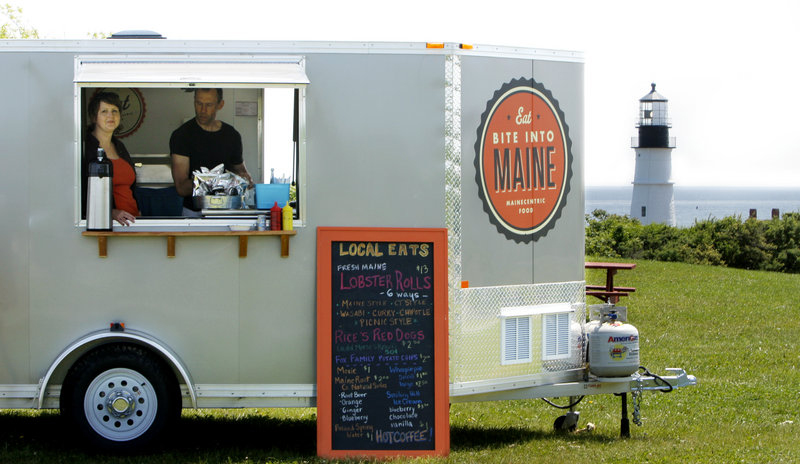PORTLAND – Earlier this year, Sarah and Karl Sutton wanted to open a food truck in Portland to sell gourmet lobster rolls, locally made ice cream and other Maine-centric foods.
When they tried to get a permit for “Bite into Maine,” as their business is now known, city officials told them “not in Portland.”
“They didn’t have a permit that would fit us,” said Sarah Sutton, who took her business to Cape Elizabeth.
On Wednesday, Creative Portland, a nonprofit organization that promotes the city’s creative economy, took the first steps toward allowing food trucks in Portland.
The organization’s directors unanimously endorsed food trucks at their monthly meeting, and will propose an ordinance to the City Council’s Health and Recreation Committee later this year. If the committee endorses the ordinance, it will go to the City Council.
“It seems odd that we would make rules that limit people’s choices,” said Andy Graham, president of Creative Portland. “We just need to come up with policy suggestions that balance everyone’s interests.”
Food trucks — or occasionally, food trailers — are basically kitchens on wheels. Unlike food carts, which the city allows, food trucks generally have full-size refrigerators, freezers, grills and stoves, and offer more gourmet cuisine than food carts.
Well-equipped trucks allow chefs to make more creative food, and allow owners to produce that food in larger quantities. Food trucks have become popular in other “foodie” cities, such as Portland, Ore., Seattle and Los Angeles.
Portland, Maine, prohibits food trucks because “nobody has come to us with a regulatory scheme that’s been accepted and balances all the needs,” said Mary Costigan, a city attorney.
But Anestes Fotiades, who runs the website Portland Food Map and attended Wednesday’s meeting, said food trucks are a worthwhile venture for the city to endorse.
“First, it’s likely to increase the genetic diversity of the city’s food options,” Fotiades said. “And why should there be rules that inhibit a food entrepreneur because of the format they choose?”
An ordinance would likely have to address issues such as parking, where trucks can stop, the hours they can operate, the noise levels of their power sources, and how far they must be from restaurants.
The city now requires food carts to be at least 65 feet from restaurants and other carts, Costigan said, and that’s unlikely to change with food trucks.
City Councilor David Marshall, a member of Creative Portland’s board of directors who didn’t attend Wednesday’s meeting, said he would like Portland to have a designated area where food trucks could go and have power sources waiting for them, as Portland, Ore., does.
But other directors and people at the meeting said that would defeat the purpose of “mobile kitchens,” as food trucks are often called. Graham suggested designating a number of areas, to allow both regulation and mobility.
Despite disagreements, everyone who spoke at the meeting appeared enthused by the idea. Andre Polhill and Helen Andreoli, who want to start a food truck in the city with barbecue and Southern comfort food, said food trucks fit with Portland’s “foodie” reputation.
“Other cities are already doing it,” Polhill said. “Let’s do it here.”
The Portland Downtown District, which promotes economic interests of downtown business owners, may have reservations about food trucks, Costigan said.
Jan Beitzer, the organization’s executive director, didn’t immediately return a phone message Wednesday. But based on comments in 2009, when the issue last came before the Health and Recreation Committee, she may have concerns about trucks taking business from restaurants, Costigan said.
“They likely won’t want them in the Old Port, and they likely won’t want the distance restrictions altered,” Costigan said of the Portland Downtown District.
Creative Portland board members said food trucks would likely take more business from fast-food restaurants than from sit-down establishments. People who go to food trucks want something quick, they said.
After the city rejected their bid to start a food truck, the Suttons opened their “Bite into Maine” trailer at Fort Williams Park in Cape Elizabeth. Their six varieties of gourmet lobster rolls, including traditional, chipotle and curried, have become a hit.
Even if the city allows food trucks, the Suttons said, they likely won’t move their business because of their success at Fort Williams. If they choose to expand, however, they would consider doing so in Portland.
Either way, Sarah Sutton said she’s glad that Creative Portland is taking up the cause.
“Nothing attracts a crowd like a crowd,” she said. “And based on other cities, food trucks attract people. That could benefit all businesses.”
Staff Writer Jason Singer can be contacted at 791-6437 or at:
jsinger@pressherald.com
Send questions/comments to the editors.


